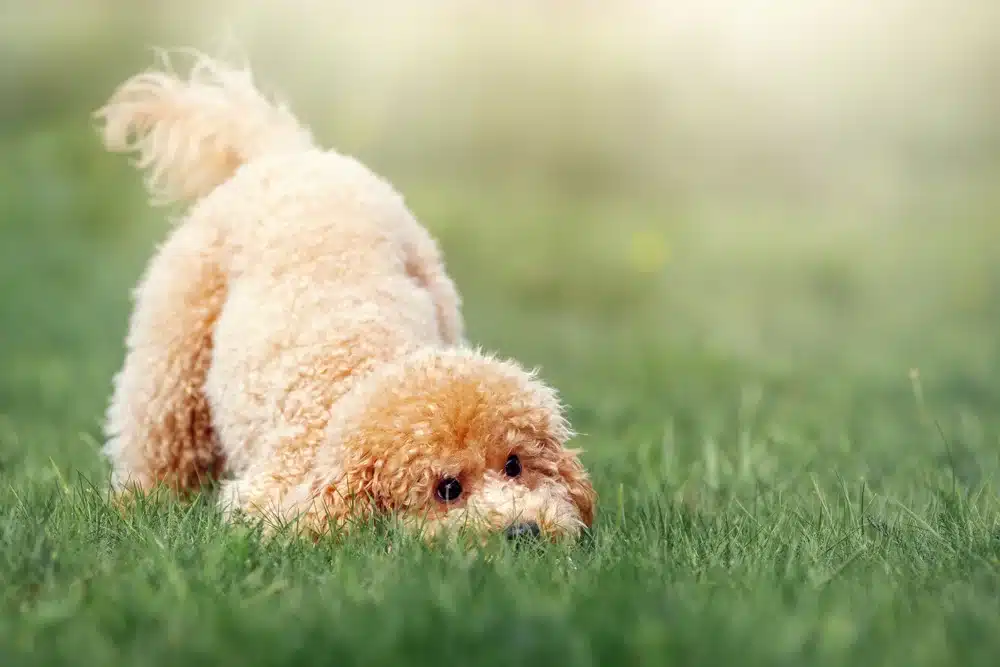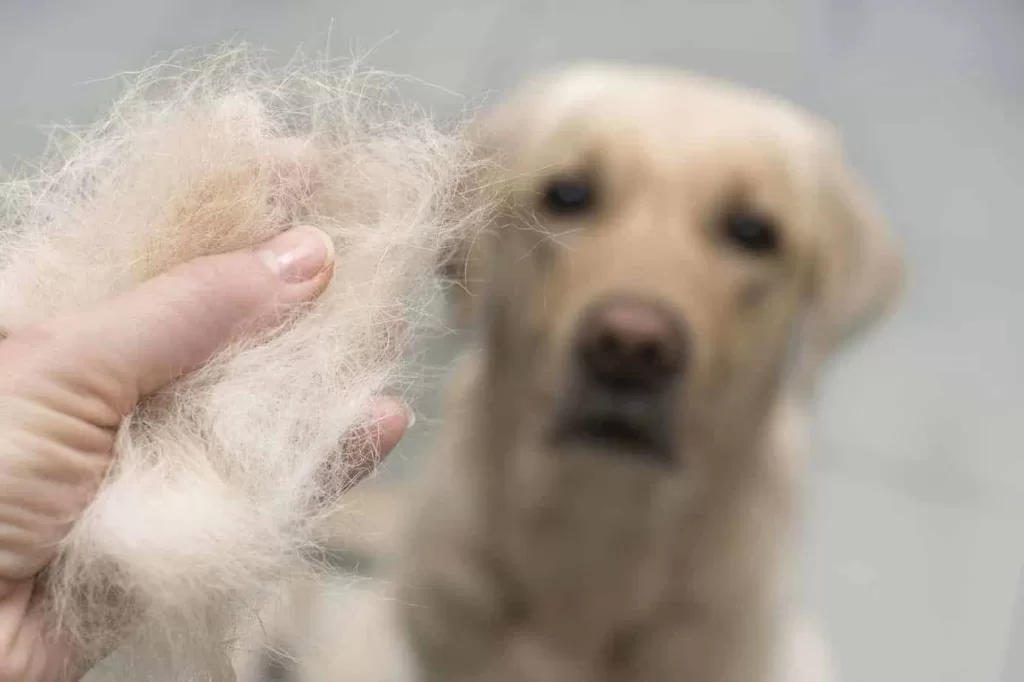Seeing your dog lose hair can be upsetting. Dog hair loss, or canine alopecia, is common and can stem from many causes. Luckily, there are home remedies and natural solutions to help. This article will cover the reasons for dog hair loss, offer tips, and share effective treatments.
Table of Contents
Key Takeaways
- Understand the common triggers of dog hair loss, such as allergies, hormonal imbalances, and skin conditions.
- Recognize the signs and patterns of abnormal shedding to determine when to seek professional help.
- Discover natural home remedies, including essential oils and herbal solutions, that can effectively treat dog hair loss.
- Learn about dietary changes and grooming techniques that can promote healthy coat growth.
- Implement preventive measures and stress reduction strategies to maintain your dog’s overall well-being.
Understanding Dog Hair Loss: Causes and Symptoms
As pet owners, we often wonder why our dogs lose hair. Many things can cause this, like allergies or hormonal issues. Knowing what causes it is the first step to stop it.
Common Triggers of Dog Hair Loss
- Allergies, both environmental and food-related, can cause dogs to excessively groom and lick their coats, leading to bald spots and thinning fur.
- Parasitic infections, such as mites or fleas, can irritate the skin and cause dogs to scratch, resulting in hair loss.
- Hormonal imbalances, like thyroid dysfunction or Cushing’s disease, can disrupt the normal hair growth cycle.
- Nutritional deficiencies, such as lacking protein, essential fatty acids, or vitamins, can lead to poor coat condition and shedding.
Signs and Patterns of Abnormal Shedding
Watch for these signs of hair loss in your dog:
- Excessive shedding, with noticeable clumps of hair being left behind on furniture or clothing.
- Patchy or uneven hair loss, specially around the face, legs, or abdomen.
- Brittle, dry, or dull-looking fur that appears to be thinning over time.
When to Be Concerned About Your Dog’s Hair Loss
If your dog’s hair loss seems odd, or if they show signs like skin irritation or lethargy, see a vet. They can find the cause and suggest treatments.
Dog Hair Loss Home Remedies That Actually Work
If your dog is shedding too much or has bald spots, there’s hope. There are many homemade hairball remedies for dogs that can help. Try coconut oil massages or apple cider vinegar rinses to make your dog’s coat shine again.
Using pure aloe vera gel on your dog’s bald spots is a great idea. Massage it in to hydrate and nourish the skin. Aloe vera can calm inflammation and help new hair grow.
- Apple Cider Vinegar Rinse: Mix equal parts apple cider vinegar and water. Use it to rinse your dog after bathing. It helps balance the skin’s pH and fights off infections.
- Coconut Oil Massage: Warm some virgin coconut oil in your hands. Massage it into your dog’s coat and skin. It moisturizes and fights off bacteria, helping hair grow back.
“These natural solutions can work wonders in restoring your pup’s lustrous coat.”
Remember, using these homemade hairball remedies for dogs regularly is important. Add them to your dog’s grooming routine. With patience, your dog’s coat will shine again.
Natural Ingredients for Treating Pet Fur Problems
We all want our dogs to have a shiny coat. When dealing with hair loss, natural remedies are key. We’ll look at essential oils, herbal solutions, and DIY treatments for hair regrowth.
Essential Oils and Their Benefits
Essential oils from nature can help dogs with hair loss. Lavender oil calms dogs and can reduce stress, a common cause of hair loss. Chamomile oil soothes and reduces inflammation, great for irritated skin.
Herbal Solutions for Hair Regrowth
Herbs can also fight canine alopecia. Rosemary boosts blood flow and hair growth. Nettle is full of vitamins and minerals for healthy fur. Adding these to your dog’s care can help.
DIY Topical Treatment Recipes
Try making your own treatments for hair loss. Here are a few easy recipes:
- Lavender and Chamomile Soothing Spray: Mix 10 drops of lavender oil, 10 drops of chamomile oil, and 1 cup of distilled water in a spray bottle. Mist your dog’s coat gently to help reduce inflammation and promote relaxation.
- Rosemary and Nettle Hair Growth Serum: Steep 1 cup of dried rosemary and 1 cup of dried nettle in 2 cups of boiling water for 30 minutes. Strain the mixture and allow it to cool. Apply the serum directly to your dog’s skin to encourage healthy hair regrowth.
Using these natural solutions can help your dog’s coat health and reduce shedding.
Dietary Changes to Promote Healthy Coat Growth

Keeping our dogs’ coats healthy and shiny is key. But, pet fur loss can be a challenge. Luckily, simple diet changes can help. Let’s look at the important nutrients for a healthy coat.
Omega-3 fatty acids are vital for skin and coat health in dogs. You can find them in fish oils, flaxseeds, and some plant oils. Adding these to your dog’s diet can reduce inflammation and improve their coat.
A balanced diet with vitamins and minerals is also essential. Vitamins A, B, and E, along with zinc and iron, support hair growth. You can add multivitamins or foods like sweet potatoes, spinach, and lean meats to their meals.
“A healthy diet is the foundation for a healthy coat. By focusing on the right nutrients, you can help your dog’s fur shine and reduce pet fur loss.”
Every dog is different, so talk to your vet about the best diet for your pet. With the right diet, you can prevent dog coat thinning and keep their coat looking great.
Preventive Measures and Grooming Techniques
To keep your dog’s coat healthy and reduce hair loss, start early. Regular grooming and watching out for environmental factors can help a lot. Let’s look at some good ways to keep your dog’s fur looking great and prevent too much shedding.
Regular Brushing and Coat Maintenance
Brushing your dog regularly is key for preventing hair loss. It helps remove dead and loose hair, cutting down on shedding at home. Choose a good brush or comb for your dog’s coat type and groom them a few times a week. This simple act can help the skin, spread natural oils, and encourage new hair growth.
Environmental Factors to Consider
Your dog’s surroundings can affect their hair health. Watch out for things like temperature, humidity, and allergens or irritants. These can cause bald spots. Make sure your dog has a comfy, stress-free place to live. Using air purifiers or humidifiers can help keep the air right for them.
Stress Reduction Strategies
Stress can make dogs shed more. Use relaxation methods like gentle massage, calming music, or fun playtime to help them relax. This can help keep their coat healthy and their skin in good shape.
By using these steps and grooming tips, you can help keep your dog’s coat healthy and reduce hair loss. A bit of effort can make a big difference in your dog’s fur health.
Conclusion
Addressing dog hair loss needs a proactive approach. Understanding the causes and using home remedies can help. This includes using natural ingredients and making diet changes.
Regular grooming and managing stress are also key. These steps help keep your dog’s fur healthy. Always watch for changes in your pet’s coat and see a vet if hair loss doesn’t stop.
Following the advice in this article can help solve your dog’s hair loss. With effort and patience, your dog can have a shiny, healthy coat. This will improve their health and your relationship with them.

